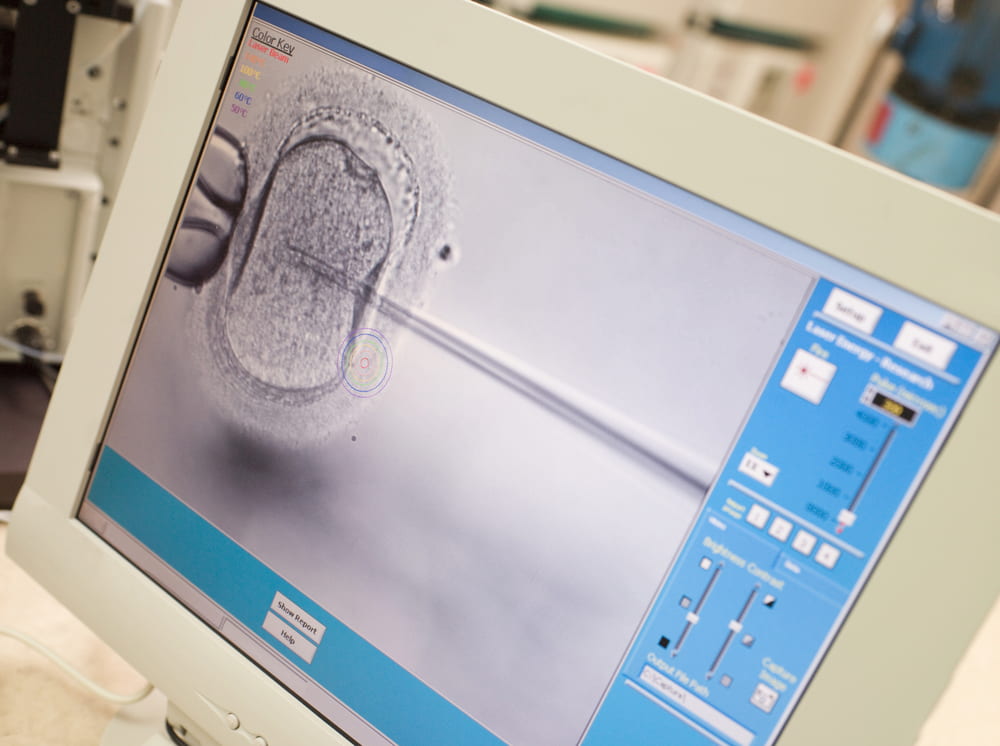
More women are waiting until later in life to conceive a child. If they have trouble conceiving naturally, they can turn to a modern in-vitro fertilization (IVF) program with ICSI to help them. Intracytoplasmic sperm injections (ICSI) are a part of the IVF program and allow millions of women around the world to successfully conceive a child. But ICSI success rates decline as women age. We’ll start the exploration of age and ICSI success rates with a step-by-step explanation of what an ICSI procedure entails. Next, we’ll explore how much the success rates of the procedure decline with age.
What is ICSI?
Intracytoplasmic sperm injections (ICSI) is a six-step procedure in an IVF program in which the eggs are removed from the ovaries, fertilized, and monitored, and the resulting embryos are placed back in the womb. The steps of ICSI include:
- Step one is suppressing the natural menstrual cycle. The patient is given medicine in the form of a daily, self-administered injection or a nasal spray that is taken for about two weeks.
- Step two Is taking a follicle-stimulating hormone (FSH). This hormone increases the number of eggs the patient’s ovaries produce, so more eggs can be collected and fertilized, thus creating a larger number of embryos to use in the selection process.
- Step three involves monitoring the patient to check the number of eggs being produced. Before the eggs are collected, the patient is given a hormone called human chorionic gonadotropin (HCG) to help the eggs mature.
- Step four is collecting the eggs with the patient sedated. The specialist will use a needle passed through the vagina and into the ovaries. The process takes about 15 to 20 minutes, and the doctor monitors their progress using ultrasound.
- Step five is fertilizing the collected eggs. The eggs are taken into a laboratory and fertilized with the partner’s or a donor’s sperm. ICSI is when each egg is fertilized individually by injecting the sperm directly into the egg.
- Step six involves transferring the most viable embryos back into the womb. The fertilized eggs are monitored as they continue to grow in the laboratory for up to six days. The doctor then chooses the best one or two embryos and transfers them back into the womb.
Age and ICSI Success Rates
The peak fertility years for women are typically in the early to mid-20s. By the early 30s, fertility starts to decline. However, women in the 30-35 age group have a high ICSI success rate that frequently exceeds 40% per cycle of IVF treatment.
Women in the 35-37 age group also have high chances of success when using ICSI. Their success rate is between 35% and 40%. Women in this age group and in their first or second IVF cycle will generally only be given a single embryo transfer if one or more quality embryos are available. They’ll be given two embryos if no quality embryos are apparent. In the third cycle, no more than two embryos should be transferred.
Conception rates for women using ICSI in the 38 to 40 age group start to decline but are still an encouraging 30% per cycle. Women in this age group undergoing their first and second IVF cycles will also generally be restricted to having a single embryo transferred if one or more quality embryos are available. In the third cycle, if no high-quality embryos are available, up to two embryos can be transferred.
Women over 40 may have significantly lower chances, even when using ICSI. The chances often fall below the 20% level per cycle. These patients may increase their chances by having a double embryo transfer.

Factors Influencing Conception Success Rates
The two largest factors affecting the success rates of ICSI and IVF treatments are the age of the patient, and the quality of the sperm. As women age, the quality and number of eggs being produced decline naturally.
The sperm quality is crucial to the success of the IVF and ICSI process. Before undergoing ICSI, the sperm is evaluated and tested to determine sperm count, form and motility (movement). Sperm that falls below a certain level reduces the chances of a successful conception. However, there are sperm retrieval techniques for ICSI that can boost the chances of success.
Contact V-Fertility Center in Bangkok
If you have been trying to conceive but have been unsuccessful, boost your chances by visiting an ICSI clinic in Thailand. Vejthani Hospital’s V-Fertility Center in Bangkok is a leading fertility center in Thailand with over fifteen years of experience. Make an appointment for a consultation with one of our fertility specialists.

The team of specialists in obstetrics and gynecology and reproductive medicine





No Comments
Sorry, the comment form is closed at this time.